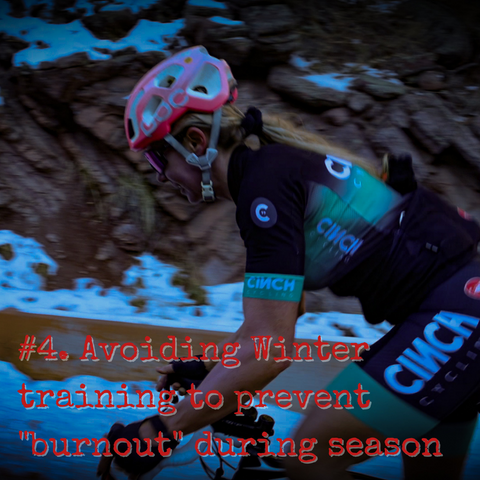
For as long I have been riding a bike I have always seen the Winter months as a giant opportunity. As a Pro I would use the Winter to gain a level on my competition. As a kid, I used the Winter to pass my neighborhood friend’s fitness and cycling ability. If you want to level up in cycling, the Winter is your time!
Now as a coach I try to motivate athletes of all abilities to follow suit and make big progress. Unfortunately, many times my advice falls on deaf ears.
So I am trying something different. This post is going to be an awareness message, essentially listing the traps to try and avoid in Winter training. For fun, we are going to call these traps “The Seven Deadly Sins of Winter Training.”
So let’s have a look at the 7 mistakes to avoid this Winter that WILL tank your progress in 2021.

1. Putting a pause this Winter on structured training.
- The Winter is the LAST place you should do this. Structure is not bad. It is good. All it is is drawing a line in the sand with a start line and a finish line while adding defined targets. It HELPS you make progress AND enjoy cycling at the same time.

- In the Winter the biggest challenge is lack of time. The days are shorter, the temperature is colder, and the life schedules are more hectic. You have to plan and schedule your workouts in your day ahead of time!

- Sport is neuromuscular and cycling is no different. But people in the Winter time love to create new “strength” routines that involve extra equipment, people, time, travel, etc. The problem is those variables lead to a lack of consistency and these routines suck needed time and energy from the bike training (which makes the biggest difference.) Keep it specific and keep it sustainable through the season. If you want to do different activities do them, but have fun with them. Categorize them as “therapy” and still do your cycling workouts too.

- The best time to progress is the Winter training because it is a quiet time that is easy to find focus. “Burnout” comes from lack of focus. Where you truly need to worry about your focus is during the Spring and Summer months when everything gets so “noisy.” Don’t reduce your training, just own that when the season hits you are going to use extra energy to stay on track with all the distractions such as group rides, races, struggles, and successes.

- Everyone is so motivated and strong in the Spring. Waiting to get serious until then is going to leave you at the back of the group, behind your goals, and in the position to play “catch up” through the Spring and Summer only to arrive where you want in the Fall when the season is winding down.

- Winter training is about growth, not about scarcity. To grow you need fuel and building blocks. Sure, you have some weight you would like to lose. Join the club! But focus on building your new engine and then let that high performance engine do the work on weight reduction. Listen, I have never seen someone who did all the work to build the engine, and used the right nutrition to fuel it, not look the part and amazing. Don’t try to just look the part, become the part.

- Just as I discussed in #3, cycling is a neuromuscular sport. It is easy to lose focus of this during the Winter riding in cold conditions and or on fixed indoor trainers. But just because it is difficult to move does not mean you need to stop practicing the techniques of cycling. In fact, the Winter is a great time to build better technique! Build technique work into your training routine and consistently integrate it into the intervals you do.









